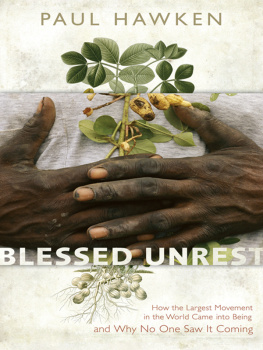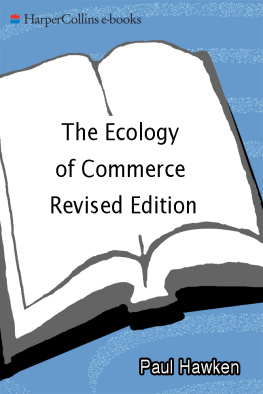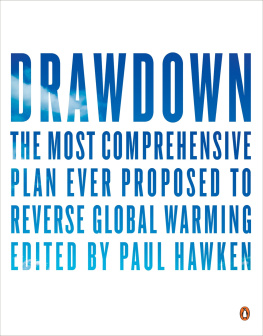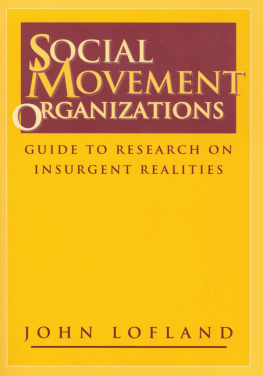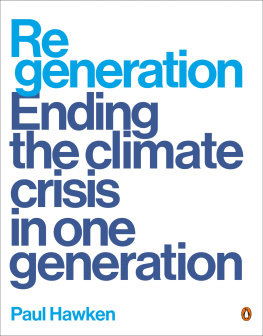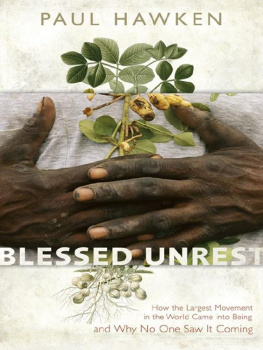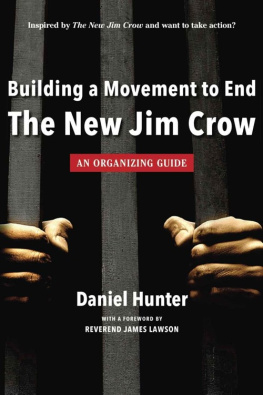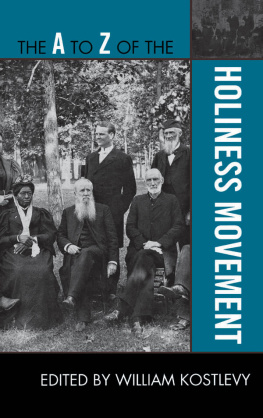BLESSED UNREST
How the Largest Movement
in the World Came into Being
and Why No One Saw It Coming
PAUL HAWKEN
VIKING
VIKING
Published by the Penguin Group
Penguin Group (USA) Inc., 375 Hudson Street, New York, New York 10014, U.S.A.
Penguin Group (Canada), 90 Eglinton Avenue East, Suite 700, Toronto, Ontario, Canada M4P 2Y3 (a division of Pearson Penguin Canada Inc.)
Penguin Books Ltd, 80 Strand, London WC2R 0RL, England
Penguin Ireland, 25 St. Stephens Green, Dublin 2, Ireland (a division of Penguin Books Ltd)
Penguin Books Australia Ltd, 250 Camberwell Road, Camberwell, Victoria 3124, Australia (a division of Pearson Australia Group Pty Ltd)
Penguin Books India Pvt Ltd, 11 Community Centre, Panchsheel Park, New Delhi 110 017, India
Penguin Group (NZ), 67 Apollo Drive, Mairangi Bay, Auckland 1311, New Zealand (a division of Pearson New Zealand Ltd)
Penguin Books (South Africa) (Pty) Ltd, 24 Sturdee Avenue, Rosebank, Johannesburg 2196, South Africa
Penguin Books Ltd, Registered Offices: 80 Strand, London WC2R 0RL, England
First published in 2007 by Viking Penguin, a member of Penguin Group (USA) Inc.
Copyright Paul Hawken, 2007
All rights reserved
LIBRARY OF CONGRESS CATALOGING IN PUBLICATION DATA
Hawken, Paul.
Blessed unrest : how the largest movement in the world came into being and why no one saw it coming / Paul Hawken.
p. cm.
Includes bibliographical references and index.
ISBN: 978-1-1012-0232-6
1. Environmentalism. 2. Environmental justice. I. Title.
GE195.H388 2007
333.72dc22 2006101145
Without limiting the rights under copyright reserved above, no part of this publication may be reproduced, stored in or introduced into a retrieval system, or transmitted, in any form or by any means (electronic, mechanical, photocopying, recording or otherwise), without the prior written permission of both the copyright owner and the above publisher of this book.
The scanning, uploading, and distribution of this book via the Internet or via any other means without the permission of the publisher is illegal and punishable by law. Please purchase only authorized electronic editions and do not participate in or encourage electronic piracy of copyrightable materials. Your support of the authors rights is appreciated.
To Margaret Reed, the source of this
BLESSED UNREST
THE BEGINNING
O ver the past fifteen years I have given nearly one thousand talks about the environment, and every time I have done so I have felt like a tightrope performer struggling to maintain perfect balance. To be sure, people are curious to know what is happening to their world, but no speaker wants to leave an auditorium depressed, however dark and frightening a tomorrow is predicted by the science that studies the rate of environmental loss. To be sanguine about the future, however, requires a plausible basis for constructive action: you cannot describe possibilities for that future unless the present problem is accurately defined. Bridging the chasm between the two was always a challenge, but audiences kindly ignored my intellectual vertigo and over time provided a rare perspective instead. After every speech a smaller crowd would gather to talk, ask questions, and exchange business cards. These people were typically working on the most salient issues of our day: climate change, poverty, deforestation, peace, water, hunger, conservation, human rights. They came from the nonprofit and nongovernmental world, also known as civil society; they looked after rivers and bays, educated consumers about sustainable agriculture, retrofitted houses with solar panels, lobbied state legislatures about pollution, fought against corporate-weighted trade policies, worked to green inner cities, and taught children about the environment. Quite simply, they had dedicated themselves to trying to safeguard nature and ensure justice. Although this was the 1990s, and the media largely ignored them, in those small meetings I had a chance to listen to their concerns. They were students, grandmothers, teenagers, tribe members, businesspeople, architects, teachers, retired professors, and worried mothers and fathers. Because I was itinerant, and the organizations they represented were rooted in their communities, over the years I began to grasp the diversity of these groups and their cumulative number. My interlocutors had a lot to say. They were informed, imaginative, and vital, and offered ideas, information, and insight. To a great extent Blessed Unrest is their gift to me.
My new friends would thrust articles and books into my hands, tuck small gifts into my knapsack, or pass along proposals for green companies. A Native American taught me that the division between ecology and human rights was an artificial one, that the environmental and social justice movements addressed two sides of a single larger dilemma. The way we harm the earth affects all people, and how we treat one another is reflected in how we treat the earth. As my talks began to mirror my deeper understanding, the hands offering business cards grew more diverse. I would get from five to thirty such cards per speech, and after being on the road for a week or two would return home with a few hundred of them stuffed into various pockets. I would lay them out on the table in my kitchen, read the names, look at the logos, envisage the missions, and marvel at the scope and diversity of what groups were doing on behalf of others. Later, I would store them in drawers or paper bags as keepsakes of the journey. Over the course of years the number of cards mounted into the thousands, and whenever I glanced at them, I came back to one question: Did anyone truly appreciate how many groups and organizations were engaged in progressive causes? At first, this was a matter of curiosity on my part, but it slowly grew into a hunch that something larger was afoot, a significant social movement that was eluding the radar of mainstream culture.
So, curious, I began to count. I looked at government records for different countries and, using various methods to approximate the number of environmental and social justice groups from tax census data, I initially estimated a total of 30,000 environmental organizations around the globe; when I added social justice and indigenous peoples rights organizations, the number exceeded 100,000. I then researched to see if there had ever been any equals to this movement in scale or scope, but I couldnt find anything, past or present. The more I probed, the more I unearthed, and the numbers continued to climb, as I discovered lists, indexes, and small databases specific to certain sectors or geographic areas. In trying to pick up a stone, I found the exposed tip of a much larger geological formation. I soon realized that my initial estimate of 100,000 organizations was off by at least a factor of ten, and I now believe there are over oneand maybe even twomillion organizations working toward ecological sustainability and social justice.
By any conventional definition, this vast collection of committed individuals does not constitute a movement. Movements have leaders and ideologies. People join movements, study their tracts, and identify themselves with a group. They read the biography of the founder(s) or listen to them perorate on tape or in person. Movements, in short, have followers. This movement, however, doesnt fit the standard model. It is dispersed, inchoate, and fiercely independent. It has no manifesto or doctrine, no overriding authority to check with. It is taking shape in schoolrooms, farms, jungles, villages, companies, deserts, fisheries, slumsand yes, even fancy New York hotels. One of its distinctive features is that it is tentatively emerging as a global humanitarian movement arising from the bottom up. Historically social movements have arisen primarily in response to injustice, inequities, and corruption. Those woes still remain legion, joined by a new condition that has no precedent: the planet has a life-threatening disease, marked by massive ecological degradation and rapid climate change. As I counted the vast number of organizations it crossed my mind that perhaps I was witnessing the growth of something organic, if not biologic. Rather than a movement in the conventional sense, could it be an instinctive, collective response to threat? Is it atomized for reasons that are innate to its purpose? How does it function? How fast is it growing? How is it connected? Why is it largely ignored? Does it have a history? Can it successfully address the issues that governments are failing to do: energy, jobs, conservation, poverty, and global warming? Will it become centralized, or will it continue to be dispersed and cede its power to ideologies and fundamentalism?

